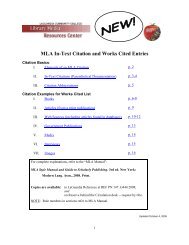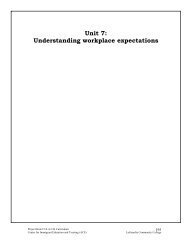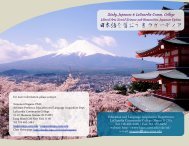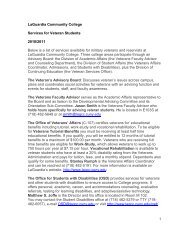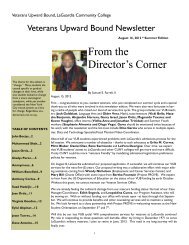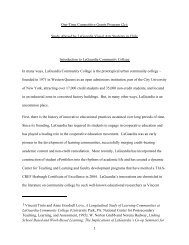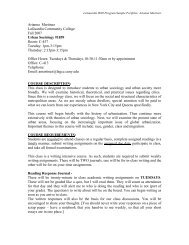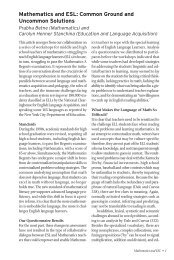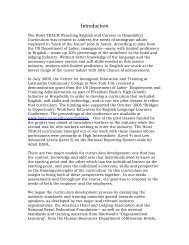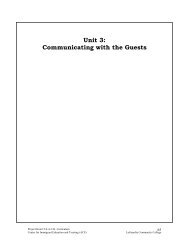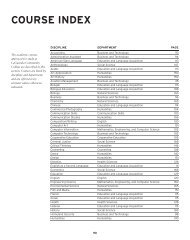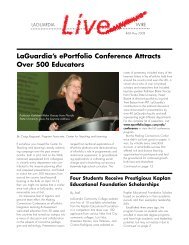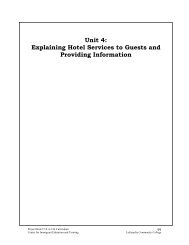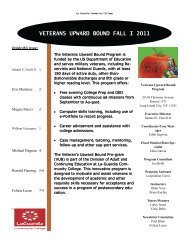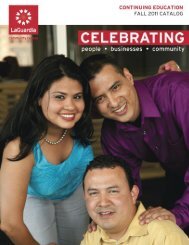Instructional Staff Handbook - LaGuardia Community College
Instructional Staff Handbook - LaGuardia Community College
Instructional Staff Handbook - LaGuardia Community College
Create successful ePaper yourself
Turn your PDF publications into a flip-book with our unique Google optimized e-Paper software.
TABLE OF CONTENTS<br />
GENERAL EMPLOYMENT APPLICATION INFORMATION ...................................................... 1<br />
OUR MISSION ............................................................................................................................................ 2<br />
OVERVIEW OF THE COLLEGE ............................................................................................................ 3<br />
ORGANIZATION OF THE COLLEGE .................................................................................................. 5<br />
UNIVERSITY STANDARDS, PERSONNEL POLICIES AND PROCEDURES ........................... 8<br />
RECRUITMENT PROCEDURES ........................................................................................................ 11<br />
APPOINTMENT PROCEDURES........................................................................................................ 12<br />
IMMIGRATION ISSUES ....................................................................................................................... 13<br />
REAPPOINTMENT PROCEDURES FOR LECTURERS, INSTRUCTORS AND<br />
PROFESSORIAL TITLES ..................................................................................................................... 14<br />
EVALUATION OF INSTRUCTIONAL STAFF MEMBERS (TEACHING)............................... 16<br />
PROMOTION PROCEDURES FOR PROFESSORIAL TITLES .................................................. 18<br />
TENURE/CERTIFICATE OF CONTINUOUS EMPLOYMENT (CCE) ..................................... 21<br />
COLLEGE LABORATORY TECHNICIANS (CLT) Titles ............................................................ 23<br />
HIGHER EDUCATION OFFICER (HEO) TITLES ......................................................................... 23<br />
PROFESSIONAL DEVELOPMENT ................................................................................................... 26<br />
LEAVES OF ABSENCE FOR MEMBERS OF THE INSTRUCTIONAL STAFF ...................... 28<br />
SUMMARY OF BENEFITS .................................................................................................................. 33<br />
COLLEGE GOVERNANCE ................................................................................................................... 34<br />
EMERGENCY INFORMATION .......................................................................................................... 37<br />
HUMAN RESOURCES DEPARTMENT STAFF DIRECTORY ................................................... 39<br />
REFERENCE DOCUMENTS ............................................................................................................... 41
GENERAL EMPLOYMENT APPLICATION INFORMATION<br />
The City University of New York adheres to the provisions of the Immigration and Reform<br />
Control Act. Applicants selected for employment must provide proof of identity and the<br />
right to employment in the United States.<br />
To apply for a position, applicants must contact the designated college representative in the<br />
manner indicated on the job posting before the closing date. The closing date is the date by<br />
which all completed applications must be received.<br />
Applicants selected for employment who are receiving a public service pension from New<br />
York State or any of its political subdivisions including New York City will need a waiver<br />
of state law. CUNY will attempt to obtain the waiver, if appropriate. Such applicants are<br />
required by CUNY policy to indicate that they are receiving a New York public service<br />
pension.<br />
The City University of New York complies with the provisions of the Americans with<br />
Disabilities Act. Reasonable accommodation is available, upon request.<br />
The City University of New York is an Equal Opportunity/Affirmative Action Employer.<br />
Warning:<br />
In accordance with New York Civil Service Law, Article 4, Section 50, applicants found to<br />
have intentionally made a false statement of any material fact will be disqualified; if<br />
already appointed, such appointment will be revoked.<br />
1
OUR MISSION<br />
Description<br />
<strong>LaGuardia</strong> <strong>Community</strong> <strong>College</strong> of the City University of New York is named for Fiorello<br />
H. <strong>LaGuardia</strong>, New York City’s New Deal mayor, who inspired a city of immigrants.<br />
Located at a transit hub that links Queens, the city’s most ethnically diverse borough, with<br />
the world center of finance, commerce and the arts, the college provides access to higher<br />
education and serves New Yorkers of all backgrounds, ages and means.<br />
Mission<br />
<strong>LaGuardia</strong> <strong>Community</strong> <strong>College</strong>’s mission is to educate and graduate one of the<br />
most diverse student populations in the country to become critical thinkers and<br />
socially responsible citizens who help to shape a rapidly evolving society.<br />
These are the foundational elements that sustain our commitment:<br />
Our Students<br />
Our students are the energizing force behind the college. They seek knowledge, skills, and<br />
credentials to transform their own lives as well as impact their families and communities.<br />
Their dedication to the journey of lifelong learning and the richness they bring to the<br />
classroom and campus life are what define <strong>LaGuardia</strong>. Our alumni take an active role in<br />
the college community by sharing their stories and resources with current students and<br />
developing lasting relationships with the college.<br />
Our Faculty & <strong>Staff</strong><br />
Our faculty and staff are passionate professionals constantly reflecting upon their training,<br />
experience, practice, and goals to create challenging and engaging learning environments.<br />
They cherish their connections with students and enjoy learning with them and from them.<br />
Our faculty and staff are engaged in scholarly and artistic activities which evidence their<br />
intellectual excitement and rigor, their commitment to disciplinary knowledge and<br />
discovery and their deep respect for all the communities of our city.<br />
Our Programs<br />
We offer a broad range of rigorous academic programs that promote inquiry, openness, and<br />
a willingness to take on challenges. Areas include urban studies, liberal arts, business, the<br />
sciences, health, technology, developmental education, college and transfer preparation,<br />
experiential education, continuing education classes, workforce training and Honors<br />
programs. Our leadership in technology-based learning has achieved national and<br />
international recognition.<br />
2
Our <strong>Community</strong><br />
We cultivate partnerships with businesses, civic and community groups, government, and<br />
public schools to enhance the economic, cultural, and educational development of Queens<br />
and New York City and State. We aspire to set an example as advocates of sustainable<br />
practices that contribute to a healthy urban environment.<br />
OVERVIEW OF THE COLLEGE<br />
Fiorello H. <strong>LaGuardia</strong> <strong>Community</strong> <strong>College</strong> is one of 23 colleges and institutions of the City<br />
University of New York (CUNY). Since admitting the first 540 students in 1971,<br />
<strong>LaGuardia</strong> has continually supported the principles of open access and equal opportunity<br />
for all. Today, the <strong>College</strong> has grown to over 17,000 students.<br />
<strong>LaGuardia</strong> <strong>Community</strong> <strong>College</strong> is nationally acclaimed for its commitment to preparing<br />
students to become full participants in the economic and civic life of the city, nation and<br />
world via its tradition of academic excellence and innovative real world applications of<br />
classroom learning.<br />
With students from over 100 nations and over 100 languages represented in the student<br />
body, many of our students are recent arrivals to the United States specifically to study at<br />
<strong>LaGuardia</strong>. The <strong>College</strong>, through an array of academic disciplines, serves students in both<br />
associate degree and certificate programs. Our 56 degree programs and 4 certificate<br />
programs meet the needs of all students, whether they plan to continue study toward a<br />
baccalaureate degree at a four-year college or are seeking to immediately embark on a<br />
career.<br />
Each year, we reach out to the following communities: homeless, senior citizen, prisoner,<br />
hard of hearing, recent immigrant and the under and unemployed through a variety of noncredit<br />
programs in continuing education. Some 38,000 students take advantage of these<br />
courses available both on and off campus.<br />
Campus<br />
4 buildings, over 1.5 million square feet, which includes over 100,000 square feet of<br />
laboratories, a 750 seat theater, 6-lane NCAA regulation size swimming pool, fitness<br />
center, sports gymnasium, tennis court and the Archives of New York Mayors <strong>LaGuardia</strong>,<br />
Wagner, Beam, Koch and the New York City Council.<br />
Location<br />
Western Queens, 10 minutes by subway from Times Square and just minutes from<br />
Brooklyn. Long Island City is quickly becoming a center for the New York City arts scene.<br />
Queens is the most rapidly growing borough of New York City, as well as its most<br />
ethnically diverse borough, which makes it the ideal place to learn about business, science<br />
& technology, health & human services and the arts.<br />
3
High School and Pre-<strong>College</strong> Programs<br />
<strong>LaGuardia</strong>, through co-op internships, provides the perfect academic and professional<br />
blend giving the skills necessary for a full life of work, service and personal growth.<br />
<strong>LaGuardia</strong> educates thousands of New Yorkers annually via our various pre-college<br />
programs. Many of these programs are partnerships with local public middle schools and<br />
high schools, the community school districts in Queens, the rest of New York City, the<br />
NYC Board of Education, the U.S. Department of Education or other colleges within and<br />
outside of the City University of New York<br />
International High School is a multicultural alternative educational environment for recent<br />
immigrants. It serves students with varying degree of limited English proficiency. Located<br />
on the <strong>LaGuardia</strong> campus, the school offers a high school/college curriculum with intensive<br />
study and reinforcement of English.<br />
Middle <strong>College</strong> High School is a six-year program that combines grades 9 through 12 with<br />
the first two years of college. Located on the <strong>LaGuardia</strong> campus, it provides intensive<br />
guidance, small classes, career exploration, and an interdisciplinary curriculum to students<br />
who might not reach their potential in a traditional school setting.<br />
Robert F. Wagner Jr. Institute for the Arts and Technology provides students in grades 7<br />
through 12 with interdisciplinary curriculum, small classes and intensive guidance<br />
programs, focusing on the arts and technology. It is located one block from the main<br />
<strong>LaGuardia</strong> campus.<br />
<strong>College</strong> Now! is a CUNY initiative that enables juniors and seniors in 27 Queens high<br />
schools to take college credit and non-credit bearing courses and ninth and tenth graders to<br />
participate in a range of activities, including specially designed high school courses, on our<br />
college campus and at their own high schools.<br />
<strong>College</strong> Connection is a <strong>LaGuardia</strong> sponsored program, which makes it possible for junior<br />
and senior high school students to take <strong>LaGuardia</strong> courses on campus.<br />
The Liberty Partnership Program is a high school retention and college preparation<br />
program operating with Grover Cleveland, Franklin K. Lane and Newtown High Schools.<br />
Project Upward Bound serves low-income students from Aviation, W.C. Bryant,<br />
International High School, Middle <strong>College</strong>, Newtown and Robert F. Wagner high schools.<br />
This program prepares low income and first generation students for post-secondary<br />
education. In partnership with Vassar <strong>College</strong>, Upward Bound sends 40 students to Vassar<br />
each summer for a six-week academically challenging program of classes and<br />
extracurricular activities.<br />
The Early <strong>College</strong> Program funded by Bill and Melinda Gates at Middle <strong>College</strong> High<br />
School and International High School at <strong>LaGuardia</strong> <strong>Community</strong> <strong>College</strong> is an intensive<br />
academic program that combines high school and college. At completion in the 13th year,<br />
each student graduates with a high school diploma and an Associate’s Degree.<br />
4
Recent <strong>LaGuardia</strong> Honors, Recognition and Accolades<br />
2009 - Recognized by Excelencia! In Education for its exemplary leadership in<br />
serving the needs of Latino and nontraditional students<br />
2008 – Winner, City University of New York (CUNY) Sustainability Award<br />
2007 – Exemplary <strong>Instructional</strong> Programs and Services - Bellwether Award given<br />
by the <strong>Community</strong> <strong>College</strong>s Futures Assembly<br />
2006 - MetLife Foundation's <strong>Community</strong> <strong>College</strong> Excellence Award - for<br />
successfully helping under-served students meet their academic and career goals<br />
2005 - <strong>Community</strong> <strong>College</strong> Survey of Student Engagement recognized <strong>LaGuardia</strong><br />
as a top performer in engaging students and helping them succeed in their<br />
educational goals<br />
2005 - Award for Innovation to <strong>LaGuardia</strong>'s First Year Academies by the<br />
Conference on Basic Writing.<br />
2004 - Theodore M. Hesburgh Award Certificate of Excellence from TIAA CREF<br />
for innovative faculty training programs.<br />
2003 – One of the top three large <strong>Community</strong> <strong>College</strong>s in the nation – named by the<br />
<strong>Community</strong> <strong>College</strong> Survey of Student Engagement<br />
2002 - Selected as one of the 13 Institutions of Excellence in the First <strong>College</strong> Year<br />
by the Policy Center of the First Year of <strong>College</strong>, funded by Pew Charitable Trusts<br />
2004 - 2009 CUNY Productivity Awards to the Division of Administration<br />
2005 – CUNY Productivity Award for the <strong>Staff</strong> Development and Training<br />
Program, Human Resources Department<br />
ORGANIZATION OF THE COLLEGE<br />
There are ten academic departments and programs:<br />
1. Business and Technology<br />
2. Counseling<br />
3. Education and Language Acquisition<br />
4. English<br />
5. Health Sciences<br />
6. Humanities<br />
7. Mathematics, Engineering and Computer Science<br />
5
8. Natural Sciences<br />
9. Social Science<br />
10. The Library/Media Resource Center<br />
Degree programs offered by the <strong>College</strong><br />
The college offers programs leading to three types of degrees: the Associate in Arts (AA),<br />
the Associate in Science (AS), and the Associate in Applied Science (AAS). In addition,<br />
the college offers four Certificate programs. The programs of study include:<br />
Associate in Arts<br />
Childhood Education, Education Associate, Human Services<br />
Liberal Arts: Social Sciences and Humanities, Deaf Studies Option, History Option,<br />
International Studies Option, Labor and <strong>Community</strong> Organizing Option, Latin American<br />
Studies Option, Media Studies Option, Psychology Option, Philosophy Option, Theater and<br />
Communication Option, Writing and Literature<br />
Associate in Science<br />
Business Administration, Computer Science, Dietetic Technician, Engineering Science,<br />
Fine Arts, Liberal Arts, Occupational Therapy Assistant, & School Foodservice<br />
Management.<br />
Associate in Applied Science<br />
Accounting, Administrative Assistant, Business Management, Commercial Foodservice<br />
Management, Commercial Photography, Computer Operations, Criminal Justice,<br />
Emergency Medical Technician/Paramedic, Microcomputer Systems and Applications,<br />
Mortuary Science/Joint with American Academy McAllister Institute, Music Recording<br />
Technology/Joint with Institute of Audio Research, New Media Technology, Nursing,<br />
Paralegal Studies, Physical Therapist Assistant, Programming and Systems, Radiologic<br />
Technician, Travel and Tourism, and Veterinary Technology<br />
Certificate Programs<br />
Commercial Photography, Word Processing Specialist, & Practical Nursing<br />
Articulation Agreements<br />
<strong>LaGuardia</strong> has articulation agreements with over 32 public and private four-year colleges<br />
and universities. The Office for Academic Affairs has developed specific agreements that<br />
guarantee acceptance of <strong>LaGuardia</strong> credits when students transfer to these colleges after<br />
earning the Associate degree. At the time of printing, the following institutions have joined<br />
<strong>LaGuardia</strong> in articulation partnerships: Adelphi University,<br />
6
<strong>LaGuardia</strong>/Adelphi University Connection Programs, Antioch <strong>College</strong>, City <strong>College</strong>,<br />
Clarkson University, Cornell University, Gallaudet University, Hunter <strong>College</strong>, Hunter-<br />
Bellevue Nursing Program, John Jay <strong>College</strong> of Criminal Justice, Laboratory Institute of<br />
Merchandising, <strong>LaGuardia</strong>/C.W. Post, L.I.U. Transfer Programs, Manhattanville <strong>College</strong>,<br />
Marymount <strong>College</strong> (Manhattan, Tarrytown), New York City Technical <strong>College</strong>, New<br />
York University, Pratt Institute, Queens <strong>College</strong>, Shaw University, Springfield <strong>College</strong><br />
School of Human Services, St. John's University, St. Joseph's <strong>College</strong>, School of Visual<br />
Arts, SUNY, <strong>College</strong> of Technology, SUNY, Health Science Center @Brooklyn <strong>College</strong>,<br />
SUNY, Institute of Technology, Utica/Rome, SUNY @Oswego, University of Turabo,<br />
Puerto Rico, Vassar, York <strong>College</strong>.<br />
The <strong>College</strong> is divided into seven major areas:<br />
1. Office of the President<br />
Gail O. Mellow, President<br />
The President is responsible for maintaining and improving the educational standards and<br />
general academic excellence of the <strong>College</strong>. The President's responsibilities include, but<br />
are not limited to, recommending to the University the appointment, promotion and the<br />
granting of tenure to those persons who are deemed reasonably certain to contribute to the<br />
improvement of academic excellence in the <strong>College</strong> community. These recommendations<br />
are consistent with <strong>LaGuardia</strong>'s immediate and long-range objectives. The Office of Legal<br />
Affairs, Labor Compliance and Diversity reside in the Office of the President.<br />
2. Division for Academic Affairs<br />
Paul Arcario, Provost & Senior Vice President<br />
The Vice President for Academic Affairs is the Chief Academic Officer of the <strong>College</strong>.<br />
Areas of responsibility of this office include instruction and administration, freshman skills,<br />
transfer opportunities, new program development, Extended Day and English-as-a-Second<br />
Language credit programs, the Liberty Partnership and Enterprise programs, the <strong>LaGuardia</strong><br />
Archives, the <strong>LaGuardia</strong> Performing Arts Center, as well as the high schools and special<br />
projects.<br />
3. Division of Administration<br />
Shahir Erfan, Vice President<br />
The Vice President is responsible for providing and maintaining general management<br />
services for the <strong>College</strong>. Departments in this division include Administrative and Support<br />
Services, Building Operations, Business Office, Campus Security, Campus Facilities,<br />
Planning Design and Construction, OSHA, Human Resources and Records Management<br />
and Grants Development.<br />
7
4. Division of Adult and Continuing Education<br />
Jane Schulman, Vice President<br />
The Vice President is responsible for providing non-traditional students with a variety of<br />
educational programs designed to meet the needs for credit and non-credit courses both on<br />
campus and at community centers. The division consists of the Adult Learning Center, the<br />
English Language Center, the Veterans Education Center, the Family Institute, Programs<br />
for Deaf Adults and the Homeless, Alternative Education, and Small Business<br />
Management.<br />
5. Division of Student Affairs<br />
Michael Baston, Vice President<br />
The Vice President is responsible for the administration of programs designed to help<br />
students achieve the goals that are essential to their personal, academic and career<br />
development. The division consists of the following areas: Enrollment Services<br />
(Admissions, Student Financial Services, Educational Planning & Registration and<br />
Records), Student Development (Health Services, International Student Services, Office<br />
for Students with Disabilities, Early Childhood Learning and Student Life & Recreation).<br />
6. Division of Institutional Advancement<br />
Susan Lyddon, Acting Vice President<br />
The Vice President serves as the President's chief spokesperson and represents the <strong>College</strong><br />
as a spokesperson in local, regional and national media. Areas of responsibility of this<br />
office include the offices of Communication and Marketing as well as <strong>College</strong> and<br />
<strong>Community</strong> Relations.<br />
7. Division of Information Technology<br />
Henry Saltiel, Vice President<br />
The Vice President is responsible for Distance Learning, End User Support and Network<br />
Administration, Information Systems, Institutional Research and <strong>Instructional</strong> Services.<br />
UNIVERSITY STANDARDS, PERSONNEL POLICIES AND PROCEDURES<br />
The Bylaws of the Board of Trustees of the City University of New York mandate that the<br />
President, as the Executive Agent for the Board, be responsible for conserving and<br />
enhancing the educational standards of the institution. The Board's policy further requires<br />
that “the best person should be sought and that tenure should be recommended not on the<br />
8
asis of ability to meet minimum qualifications but on a high standard of excellence and<br />
increasing usefulness as a teacher and scholar.”<br />
In order to effectively accomplish this task, the <strong>College</strong> has established uniform standards<br />
and procedures to assure objectivity, impartiality and fairness in the consideration of all<br />
candidates throughout the personnel process. During the discussions and deliberations of<br />
the Divisional, Departmental and <strong>College</strong>-wide Personnel and Budget Committees, there<br />
will be a complete review of each candidate's personnel file to establish that there is a<br />
consistent record of excellence in the area of the individual's primary functions and<br />
superior contributions to the <strong>College</strong> community.<br />
The Professional <strong>Staff</strong> Congress (PSC/CUNY) is recognized by the City University of<br />
New York as the collective bargaining representative for all full-time employees of the<br />
<strong>College</strong>, serving the following titles:<br />
<strong>Instructional</strong> Teaching Titles (Faculty)<br />
• Professor<br />
• Associate Professor<br />
• Assistant Professor<br />
• Instructor<br />
• Lecturer<br />
<strong>Instructional</strong> Non-Teaching Titles<br />
• Chief <strong>College</strong> Laboratory Technician<br />
• Senior <strong>College</strong> Laboratory Technician<br />
• <strong>College</strong> Laboratory Technician<br />
• Higher Education Officer<br />
• Higher Education Associate<br />
• Higher Education Assistant<br />
• Assistant to Higher Education Officer<br />
9
Department/<strong>College</strong>wide Personnel & Budget Committees<br />
The appointment, reappointment, promotion and reappointment with tenure (Professor,<br />
Associate Professor, Assistant Professor and <strong>College</strong> Laboratory Technician) or with a<br />
Certificate of Continuous Employment (Lecturer) of all instructional staff in the Division<br />
for Academic Affairs and Adult and Continuing Education, must be reviewed by their<br />
Divisional or Departmental Personnel and Budget Committee and by the <strong>College</strong>-wide<br />
Personnel and Budget Committee. This procedure does not apply to non-teaching<br />
instructional staff members appointed in the Higher Education series titles.<br />
Membership of the Divisional or Departmental Personnel and Budget (P&B)<br />
Committees<br />
The <strong>College</strong> Governance Plan, which was approved by the Board of Higher Education in<br />
the 1978 Fall Quarter, as amended, grants all full-time members of the instructional staff<br />
the right to vote for, and serve as members of the Divisional or Departmental Personnel and<br />
Budget Committees. The staff enfranchised under the plan includes those holding the title<br />
of Professor, Associate Professor, Assistant Professor, Instructor, Lecturer, Chief <strong>College</strong><br />
Laboratory Technician, Senior <strong>College</strong> Laboratory Technician, <strong>College</strong> Laboratory<br />
Technician, and staff appointed in the Higher Education Officer Series titles in academic<br />
departments and the Division of Adult and Continuing Education. In twelve of the<br />
academic departments, the Chairperson, who also chairs the committee, is elected by the<br />
members of the department. Four other persons are elected to complete the membership of<br />
the committee. In accordance with CUNY Bylaws, four members, including the<br />
Chairperson, must be tenured. In addition, the Chairperson must hold professoriate rank.<br />
All members serve for staggered three-year terms. In the Department of Library, the Chief<br />
Librarian is appointed by the President as Chair of the Departmental P & B Committee.<br />
The Vice President of Adult and Continuing Education serves as the Chair of the<br />
Departmental P & B Committee. In each of these areas, the other four members of the<br />
Personnel and Budget Committee are elected by the members of the division or<br />
department, and serve staggered three-year terms.<br />
The committees review the appointment, reappointment, promotion and reappointment<br />
with tenure or certificate of continuous employment of all members of the instructional<br />
staff assigned to each division/department. All positive recommendations are considered by<br />
the <strong>College</strong>-wide Personnel and Budget Committee. The discussions of the Divisional or<br />
Departmental Personnel and Budget Committees are confidential, and the minutes record<br />
only the final action taken. The voting is conducted by secret ballot. It shall be the duty and<br />
responsibility of the department chairperson to communicate to the candidate the action of<br />
the committee, but no reason shall be assigned for a negative recommendation (CUNY<br />
Bylaws, Section 9.2).<br />
Membership of the <strong>College</strong>-wide Personnel and Budget Committee (P&B)<br />
The President serves as Chairperson of the <strong>College</strong>-wide Personnel and Budget Committee<br />
(P&B). The Provost & Senior Vice President for Academic Affairs serves as the President's<br />
designee. The Chief Librarian represent the Library on the committee. The elected<br />
Chairpersons of each of the ten academic departments complete the membership.<br />
10
The discussions of the <strong>College</strong>-wide Personnel and Budget Committee are confidential, and<br />
the minutes record only the final personnel action taken. Much of the voting is conducted<br />
by a secret ballot. The committee reviews all of the positive personnel actions<br />
recommended by the Divisional or Departmental Personnel and Budget Committees and<br />
makes recommendations to the President. The President makes recommendations to the<br />
Board of Trustees. The committee also reviews personnel policies and sets standards and<br />
procedures. It shall be the duty and responsibility of the President, or his/her designee, to<br />
communicate to the candidate the action of the committee, but no reason shall be assigned<br />
for a negative recommendation (CUNY Bylaws, Section 8.12).<br />
RECRUITMENT PROCEDURES<br />
The Affirmative Action Program of CUNY mandates that equal opportunity be offered to<br />
all qualified persons when vacant positions are filled. In particular, a good faith effort must<br />
be made to encourage women and minorities to apply for each available position. The<br />
search process preserves the integrity of campus selection procedures and increases the<br />
opportunity for members of protected classes to be represented in candidate pools and be<br />
selected at rates that reflect their availability in the labor market. The goal of the search<br />
procedures is to ensure the best applicants are attracted to vacancies, and that the <strong>College</strong>’s<br />
workforce is ethnically representative of the available labor pool and in full compliance<br />
with its affirmative action policy.<br />
The <strong>LaGuardia</strong> <strong>Community</strong> <strong>College</strong> Affirmative Action Search process and Procedures<br />
booklet provides a detailed overview of the search process and procedures as well as the<br />
documents required for the completion of a search. For further details on the search<br />
process, please visit www.lagcc.cuny.edu/affirmativeaction.<br />
Following approval of the vacancy by Executive Council, the hiring manager must<br />
schedule an appointment with the HR Recruiter to discuss drafting of the Job Posting for<br />
CUNYfirst. Upon receiving the draft, the HR Recruiter requests a position number from<br />
the Budget Office and make sure the posting conforms to CUNYfirst Recruitment<br />
guidelines. After a final review of the job posting by the hiring manager, it is submitted to<br />
Affirmative Action and the University via CUNYfirst for approval.<br />
When the job posting is approved by the University, the posting is automatically posted on<br />
www.cuny.edu and CUNYfirst electronically notifies the HR/Recruiter, hiring manager and<br />
the AAO. HR will then arrange to have the job posting posted on <strong>LaGuardia</strong> website and<br />
bulletin board and make arrangements for external posting venues based on what was<br />
submitted in the recruitment plan.<br />
Details for conducting a search are available on the Affirmative Action website,<br />
www.lagcc.cuny.edu/affirmativeaction.com.<br />
11
Equivalencies<br />
In certain academic areas, the Bylaws will allow the <strong>College</strong> to recommend that the<br />
University's Office for Academic Affairs grant an equivalency in lieu of the doctorate. In<br />
accordance with the Bylaws, equivalencies are available in selected disciplines with the<br />
following departments: Business & Technology, Mathematics, Engineering and Computer<br />
Science, Humanities, and Health Sciences. The board of trustees issues a listing of<br />
“Degrees in Specific Fields” that may be accepted in lieu of the PHD without prior<br />
approval.<br />
In the evaluation of a candidate's eligibility for an equivalency, it must be demonstrated<br />
that his or her experience and background is equivalent to a doctorate, and that there is a<br />
direct and specific relationship between this experience and the discipline or area in which<br />
the candidate is to be appointed.<br />
Before the <strong>College</strong> submits a request to the Board for an equivalency, the application must<br />
be reviewed and approved by the Departmental and <strong>College</strong>-wide Personnel and Budget<br />
Committees. Such requests must also be reviewed and approved by the University Vice<br />
Chancellor for Academic Affairs before being considered by the Board of Trustees of the<br />
City University of New York.<br />
APPOINTMENT PROCEDURES<br />
In order for a candidate to be considered for appointment by the Divisional or<br />
Departmental Personnel and Budget Committee, the personnel file must contain the<br />
following documents:<br />
1. Curriculum vitae;<br />
2. Official transcript from the institution awarding the highest degree obtained [note: a<br />
statement from the awarding institution is temporarily accepted pending receipt of<br />
the official transcript;<br />
3. <strong>LaGuardia</strong> <strong>Community</strong> <strong>College</strong> application for appointment;<br />
4. Affirmative action certification;<br />
5. Written professional references (A minimum of three is required.);<br />
6. Completed I-9, tax and other personnel-related forms.<br />
The rank, salary and conditions of employment as established by the Chairperson in<br />
consultation with the Vice President for Academic Affairs or the Vice President of the<br />
division, must be discussed with the candidate at the time the position is offered. After the<br />
appointment has been approved by the Departmental Personnel and Budget Committee, the<br />
candidate is then considered by the <strong>College</strong>-wide Personnel and Budget Committee. Upon<br />
a positive recommendation to the President and with the President's approval, the<br />
appointment is forwarded to the Board of Trustees for approval.<br />
12
Conditions of Employment<br />
Members of the instructional staff are required to work beginning with the first official day<br />
of the Fall Semester, 3 days prior to the start of classes (excluding Saturdays, Sundays and<br />
Holidays) to fulfill the 27-hour workload requirement of their contract. If an employee<br />
works in excess of these hours, the excess hour(s) will be paid on an adjunct basis. The<br />
academic calendar provides both students and staff with information regarding classes and<br />
intercession, and is available in the divisional or departmental offices. The Vice President<br />
or Chairperson assigns teaching and work schedules.<br />
Members of the instructional staff whose full-time appointments start with the Spring<br />
Semester are required to teach half of the 27-hour workload requirement. The one semester<br />
workload entitles the employee to remain on the payroll at 50% pay for the months of July<br />
and August. They return to 100% as of September 1. <strong>Instructional</strong> staff who resign at the<br />
end of a Fall semester may receive one month annual pay.<br />
Teaching members of the instructional staff must keep accurate attendance and grading<br />
records as part of audit requirements of the City and State of New York. Details concerning<br />
proper record keeping procedures are distributed by the Office of the Registrar each<br />
semester, with the class roster.<br />
Multiple Positions<br />
The <strong>College</strong> is mandated by the Board to carefully monitor compliance with the<br />
University's multiple position regulations. The Board of Trustees modified its statement of<br />
Policy on Multiple Positions March 2011. View the policy at<br />
http://www.lagcc.cuny.edu/humanresources/policies.htm .<br />
IMMIGRATION ISSUES<br />
Visas and Work Authorization<br />
It is the responsibility of the employee to keep their Visa and Work Authorization status up<br />
to date. If the employee recently had a change of status, he/she must bring the updated<br />
information to the Human Resources Department. Those whose work authorization expires<br />
can no longer work at the <strong>College</strong> and will be removed from payroll until valid work<br />
authorization is provided.<br />
Nonresident Alien Tax Compliance System<br />
The Internal Revenue Service (IRS), the United States government tax authority, has issued<br />
strict regulations regarding the taxation and reporting of payments made to non-US<br />
citizens. As a result, The City University of New York (CUNY) had instituted a new Non-<br />
Resident Alien Tax Compliance System. CUNY may be required to withhold US income<br />
tax and file reports with the IRS in connection with payments made by CUNY to<br />
employees who are not US citizens or permanent resident aliens and who receive payment<br />
for services. In addition, CUNY is required to report such payments to the IRS.<br />
13
All employees who are not citizens or permanent residents of the US are required to<br />
complete an individual record using the Glacier Online Tax Compliance System. They<br />
must come in person to receive a password and instructions of how to access Glacier from<br />
the Nonresident Alien Tax Specialist. The Nonresident Alien Tax Specialist,<br />
Veronica Caruso<br />
is located at the Payroll Office:<br />
31-10 Thomson Avenue, Building E-402<br />
Long Island City, NY 11101<br />
Telephone: 718-482-5531<br />
Fax: 718-609-2042<br />
Failure to complete the entire Glacier process will result in the maximum rate of US federal<br />
income tax and all other applicable taxes, including FICA, being withheld from your<br />
paycheck. Any tax withheld because the employee did not provide the required tax<br />
information will not be refunded by CUNY.<br />
REAPPOINTMENT PROCEDURES FOR LECTURERS, INSTRUCTORS AND<br />
PROFESSORIAL TITLES<br />
Notification Schedule<br />
<strong>Instructional</strong> staff members who are appointed in September or thereafter must be notified<br />
of reappointment by April 1 for the next academic year (September 1 to August 31).<br />
Thereafter, until tenure or a certificate of continuous employment is granted, staff members<br />
are notified of their reappointment by December 1. For more detailed information see<br />
Article 10 of the PSC/CUNY Agreement.<br />
The procedure established for Personnel and Budget Committees by the Board of Trustees<br />
contains the following “no presumption” statement concerning reappointment:<br />
At every step in the appointment and reappointment procedure it should be made clear to<br />
the candidate and to all concerned that, until the candidate gains tenure under the<br />
provisions of the statutes and the Bylaws of the Board, each appointment is for one year<br />
and there is no presumption of reappointment.<br />
Criteria for Reappointment<br />
Members of the instructional staff, in order to be considered for reappointment, must<br />
perform at the appropriate level in the area of their primary function, demonstrate excellent<br />
performance and show evidence of major contributions to the <strong>College</strong> to be considered for<br />
reappointment. Each of the following areas will be considered in the performance<br />
evaluation.<br />
14
1. The level at which individuals are performing in their area of primary responsibility<br />
in their assigned division or department. The following are generally or typically<br />
primary functions for members of the instructional staff:<br />
• Academic Departments - classroom instruction and/or administrative<br />
assignments;<br />
• Continuing Education - contribution to program effectiveness in assigned<br />
areas and/or administrative assignments or related duties.<br />
2. The instructional staff members' contributions to their division or department<br />
should include but not be limited to the following activities:<br />
• Curriculum development, program development, and instructional<br />
enhancement;<br />
• Coordination and improvement of specific divisional activities;<br />
• Divisional or departmental committee assignments;<br />
• Classroom observations of other faculty (full-time and adjunct) members in<br />
the department.<br />
3. The instructional staff members' contributions to the <strong>College</strong> should demonstrate<br />
their ability to develop, test and share their insights effectively with other<br />
colleagues and should include, but not be limited to the following activities:<br />
• Involvement in student recruitment and retention;<br />
• <strong>College</strong>-wide curriculum development, program improvement, and<br />
instructional enhancement;<br />
• Participation in <strong>College</strong> activities and serving in leadership roles on<br />
<strong>College</strong>-wide committees;<br />
• Service as an advisor to counseling groups or student clubs;<br />
• Participation in community and extension.<br />
4. <strong>Instructional</strong> staff members must demonstrate their commitment to their own<br />
professional growth and development. Such activities might include but are not<br />
limited to the following:<br />
• Publication of books, articles or other materials;<br />
• Attendance at professional conferences, serving on panels or presenting<br />
papers;<br />
15
• Pursuit of an advanced degree;<br />
• Research of academic issues in area of specialization as they relate to the<br />
<strong>College</strong> community.<br />
5. The instructional staff member must demonstrate the ability to work constructively<br />
and harmoniously with faculty, staff, students and cooperative education internship<br />
employers. There are two forms, which enable members of the instructional staff to<br />
record their college contributions, professional and other related activities: the<br />
Major <strong>College</strong> Contribution Form and the <strong>Instructional</strong> <strong>Staff</strong> Information Sheet.<br />
These two forms, plus peer observations of classroom teaching and student<br />
evaluations become the basis for the annual evaluation conference conducted by the<br />
Chairperson.<br />
• The Major <strong>College</strong> Contribution Form must be completed by members of the<br />
instructional staff at least once during the academic year to indicate the one<br />
major contribution the individual has made to the <strong>College</strong>. The completed form<br />
must include the name of the person to be contacted for an evaluation of the<br />
service performed.<br />
• The <strong>Instructional</strong> <strong>Staff</strong> Information Sheet must also be completed by members<br />
of the instructional staff at least once during the academic year to indicate the<br />
overall scope of their numerous activities both within and outside the <strong>College</strong>.<br />
Both forms are available at http://www.laguardia.edu/humanresources/forms.htm<br />
EVALUATION OF INSTRUCTIONAL STAFF MEMBERS (TEACHING)<br />
The policies of the Board of Trustees of the City University and the Agreement between<br />
the Board and the Professional <strong>Staff</strong> Congress both require that all members of the<br />
instructional staff be evaluated in order to maintain academic and professional standards of<br />
excellence. Evaluations serve to encourage and provide direction for the improvement of<br />
performance and provide a basis for such decisions as reappointment, promotion and<br />
tenure.<br />
Evaluation of a member of the teaching faculty shall be based on total academic<br />
performance, with special attention to teaching effectiveness, including, but not limited to,<br />
such elements as:<br />
1. Classroom instruction<br />
2. Departmental Contributions/Assignments<br />
3. <strong>College</strong> and University Contributions/Assignments<br />
4. Student Guidance<br />
16
5. Research and Scholarly writing/ Creative Works/Professional Activities<br />
6. Collegiality<br />
7. Summary<br />
Annual Performance Evaluations for <strong>Instructional</strong> <strong>Staff</strong> in the Academic<br />
Departments and Division of Adult & Continuing Education<br />
Prior to the time that instructional staff members in the Academic Departments, and the<br />
Division of Adult and Continuing Education are considered for reappointment, an annual<br />
performance evaluation is prepared for each individual by the Vice-President, Chairperson<br />
or appropriate supervisor. Tenured and certificated staffs, except Full Professors, are<br />
evaluated each academic year by April 1. The Annual Performance Evaluation form is<br />
available on the human resources website under<br />
http://www.lagcc.cuny.edu/humanresources/forms.htm.<br />
According to Article 18.3 of the PSC/CUNY Collective Bargaining agreement, members of<br />
the teaching faculty must be evaluated once each academic year. In addition to responding<br />
to each of the above ten areas, the evaluator must include a summary statement indicating<br />
an overall assessment and a listing of goals to be completed for the forthcoming year. The<br />
Major <strong>College</strong> Contribution Form and the <strong>Instructional</strong> <strong>Staff</strong> Information Sheet must be<br />
completed, presented and discussed at the annual performance evaluation conference.<br />
Tenured full professors may also be evaluated.<br />
Teaching Observations<br />
Teaching observations is one factor in the total evaluation of academic performance of the<br />
teaching staff. According to the PSC/CUNY Collective Bargaining agreement, Article<br />
18.2. (b) at least once each semester non-tenured and non-certificated members of a<br />
teaching instructional staff must be observed in the classroom. A classroom observation<br />
report form is completed by the observer after a verbal discussion regarding the content and<br />
methodology of the class. A performance observation form is also completed and attached<br />
as a cover sheet to summarize the discussion between the two parties, to generally assess<br />
the level of the teacher's ability and to include specific suggestions for improvement of<br />
instruction.<br />
Tenured and certificated members of the instructional staff can be observed once each<br />
academic year.<br />
17
Student Evaluation of the Members of the <strong>Instructional</strong> <strong>Staff</strong><br />
The policy of the Board of Trustees of the City University mandates that student<br />
evaluations of the staff be considered as part of the deliberation when candidates are<br />
reviewed for reappointment, promotion and tenure or Certificate of Continuous<br />
Employment. In addition, the <strong>College</strong> has always maintained a strong commitment to the<br />
use of student evaluations in the assessment of instructional effectiveness.<br />
During the 1981 Spring Quarter, the <strong>College</strong> Senate and the <strong>College</strong>-wide Personnel and<br />
Budget Committee reviewed and approved the SIR Student Evaluation Form prepared by<br />
the Educational Testing Service, Princeton, New Jersey. In Fall 1999, the <strong>College</strong> moved to<br />
a newer version of the SIR form, the SIRII, which is currently in practice. In Fall 2008, the<br />
<strong>College</strong> successfully piloted the eSIRII (SIRII online version) for an online course in the<br />
library. Since them the eSIRII has been used in several other academic departments.<br />
Below is a summary of student evaluation requirements:<br />
• Non-tenured faculty having taught at the <strong>College</strong> for less than two (2) years shall be<br />
routinely evaluated in 100% of their courses.<br />
• Non-tenured faculty having taught at the <strong>College</strong> for two (2) or more years shall be<br />
routinely evaluated by students in 50% of the courses they teach each academic<br />
semester. A sampling of the different courses taught by faculty shall be included in<br />
the evaluation process.<br />
• Full-time teaching faculty teaching overload do not have to be evaluated in<br />
overload sections.<br />
• Tenured faculty will be evaluated in one course per year but may request more<br />
evaluations if desired.<br />
• Tenured Full Professor evaluations are conducted at the request of the Chairperson<br />
or the Professor.<br />
The faculty members assigned to the Division of Adult and Continuing Education are<br />
evaluated by students each semester according to the procedures established by their<br />
division.<br />
PROMOTION PROCEDURES FOR PROFESSORIAL TITLES<br />
The members of the <strong>Instructional</strong> staff who have fulfilled the eligibility requirements will<br />
be considered for promotion during the Spring Semester. All successful candidates will be<br />
recommended to the Board of Trustees with an effective date of September 1.<br />
18
Criteria<br />
<strong>Instructional</strong> staff members must fulfill the criteria outlined for reappointment for<br />
promotion. In addition, the individual must demonstrate a willingness and ability to<br />
perform effectively in the higher rank. For promotion to Associate Professor and<br />
Professor, the candidate must also be recognized in his or her particular area for leadership<br />
ability. There must be evidence of the person's sustained and high quality commitment to<br />
the <strong>College</strong> over several years, as well as a written record to support the following<br />
requirements:<br />
1. Classroom instruction<br />
2. Departmental Contributions/Assignments<br />
3. <strong>College</strong> and University Contributions/Assignments<br />
4. Student Guidance<br />
5. Research and Scholarly writing/ Creative Works/Professional Activities<br />
6. Collegiality<br />
7. Summary<br />
The individual personnel file should contain the same documents as those required for<br />
reappointment. Additionally, in the case of tenured or certificated staff, superior peer<br />
observations and annual performance evaluations for the last three academic years prior to<br />
the request for promotion are required. Annual evaluations must be conducted by April 1<br />
each academic year for all tenured faculty except those in the rank of Full Professor.<br />
Eligibility<br />
In addition to fulfilling the academic requirements in accordance with the Bylaws, the<br />
candidate must have completed the following number of years in rank at the <strong>College</strong> prior<br />
to consideration:<br />
Appointment to Assistant Professor:<br />
Years in rank requirement not applicable<br />
Promotion from Assistant Professor to Associate Professor:<br />
Two years as Assistant Professor<br />
Promotion from Associate Professor to Full Professor:<br />
Two years as Associate Professor. Candidate must also be tenured.<br />
Candidates for promotion to Associate and Full Professor may be considered in the spring<br />
of their third year of appointment.<br />
19
Effective for all full-time tenure-track Faculty hired as of Fall 2011:<br />
Promotion from Assistant to Associate Professor:<br />
Three years in rank as Assistant Professor OR<br />
move to Associate Professor concurrent with award of Tenure<br />
Promotion from Associate Professor to Full Professor:<br />
Two years as Associate Professor. Candidate must also be tenured.<br />
Upon fulfillment of academic requirements, Lecturers and Instructors are eligible for<br />
consideration by the <strong>College</strong>wide Personnel and Budget Committee (P&B) for appointment<br />
to Assistant Professor.<br />
Procedure<br />
During the Spring Semester, if the instructional staff member wishes to be considered for<br />
promotion, the candidates should discuss the matter with the Vice President, or<br />
Chairperson. The personnel file should be reviewed and updated to include resumes and<br />
other important documentation.<br />
The Departmental or Divisional Committee votes on whether or not to recommend each<br />
eligible staff member who wishes to apply for promotion to Associate Professor. The<br />
successful candidates are presented by the Chairperson to the <strong>College</strong>-wide Personnel and<br />
Budget Committee for consideration. This committee votes on whether or not to<br />
recommend each candidate for promotion. The recommendation is made to the <strong>College</strong><br />
President.<br />
Promotions to Full Professor are considered by the <strong>College</strong>wide Personnel and Budget<br />
Committee only. The Committee votes on whether or not to recommend the candidate for<br />
promotion to Full Professor to the President. The final decision is made by the President,<br />
who recommends candidates for final approval to the Board of Trustees.<br />
Faculty members should seriously consider whether or not they wish to place themselves<br />
under consideration for promotion. Promotion is not automatic, nor are all candidates<br />
ready for promotion when they complete the minimum requirements of years in rank. The<br />
Bylaws of the Board of Trustees state that longevity and seniority alone shall not be<br />
sufficient for promotion. Candidates who apply for and are not granted a promotion may<br />
continue to apply each academic year.<br />
Written Materials for Faculty Promotions<br />
In order to achieve more equitable and better informed decisions on faculty promotions, the<br />
<strong>College</strong>-wide Personnel and Budget Committee will require, beginning in Spring 1999, that<br />
20
the following written materials be prepared for each candidate seeking promotion to the<br />
rank of Associate or Full Professor and be distributed to committee members two weeks in<br />
advance of the meeting at which time that candidate's promotion will be considered:<br />
1. A current version of the candidate's curriculum vitae, to be prepared by the<br />
candidate.<br />
2. A statement of no more than 10 pages, prepared by the candidate that meets the<br />
following criteria for promotion:<br />
a. Classroom instruction<br />
b. Departmental Contributions/Assignments<br />
c. <strong>College</strong> and University Contributions/Assignments<br />
d. Student Guidance<br />
e. Research and Scholarly writing/ Creative Works/Professional Activities<br />
f. Collegiality<br />
g. Summary<br />
The statements should focus on the period since the candidate's last promotion, unless the<br />
candidate was appointed to the <strong>College</strong> at his or her current rank.<br />
3. The candidate should document, in his or her personnel file, all achievements as<br />
reported in the written statement. The current curriculum vitae and written<br />
statement will also become part of the candidate's personnel file.<br />
Candidates for promotion to Full Professor will appear before the <strong>College</strong>-wide Personnel<br />
& Budget Committee. They will have no more than ten minutes to summarize or highlight<br />
the written materials they have prepared for the committee and to distribute any additional<br />
materials in support of their candidacy. Committee members will then have an opportunity<br />
to ask the candidate any questions they may have.<br />
It shall be the duty and responsibility of the President, or his/her designee, to communicate<br />
to the candidate the action of the committee, but no reason shall be assigned for a negative<br />
recommendation (CUNY Bylaws, Section 8.12).<br />
TENURE/CERTIFICATE OF CONTINUOUS EMPLOYMENT (CCE)<br />
The decision to grant a person tenure or a Certificate of Continuous Employment is the<br />
single most important personnel action ever taken by the <strong>College</strong>. Since the faculty<br />
member is awarded “lifetime” employment, this decision has a tremendous impact on our<br />
21
students and the entire <strong>College</strong> community. The procedures established for the Personnel<br />
and Budget Committee by the Board of Trustees emphasize the importance of tenure and<br />
state the following:<br />
“When the Tenure Law and Bylaws were framed, there was general agreement among<br />
representatives of the faculty and the Board that appointment of an instructor for one year,<br />
or two years or three years did not carry with it a presumption of tenure. There was<br />
agreement that the best possible persons should be sought and that tenure should be<br />
recommended not on the basis of ability to meet minimum qualifications, but on high<br />
standard of excellence and increasing usefulness as a teacher and scholar. The possibility<br />
of securing a more qualified candidate a year later, or two years later may factor in<br />
deciding upon re-appointment or non-reappointment of an existing instructor. Conditions<br />
of enrollment, budget, flexibility of teaching staff are also relevant factors in coming to a<br />
decision concerning tenure.” (Max/Khan memo, Nov. 1958)<br />
Criteria for Reappointment with Tenure/ Certificate of Continuous Employment<br />
(CCE)<br />
The criteria outlined for reappointment and promotion are applied when candidates are<br />
considered for tenure. There must be a sustained and documented record of outstanding<br />
performance in the person's primary function and an indication of his or her commitment to<br />
the <strong>College</strong>. Excellence in departmental or divisional contributions, significant <strong>College</strong><br />
contributions, commitment to professional growth and development, and demonstrated<br />
ability to work constructively and harmoniously in the context of the <strong>College</strong> are all key<br />
criteria in the review of a candidate’s record.<br />
The <strong>College</strong>'s goal of assessment is to place all of the efforts of tenure candidates in the<br />
context of their total academic performance. The instructional staff member must have<br />
consistently demonstrated the capacity to engage in creative approaches that enhance<br />
instruction and improve student retention, or in non-teaching activities that strengthen<br />
program effectiveness. There should be supporting evidence that the person's performance<br />
and contributions will be continued at the same high level after the tenure or CCE has been<br />
granted.<br />
Eligibility for Reappointment with Tenure<br />
After a member of the teaching instructional staff holding professorial rank has completed<br />
seven full years of exemplary, continuous, full-time active service at the college, he or she<br />
is eligible to be reappointed with tenure.<br />
Eligibility for Reappointment with CCE<br />
Those in the title of Lecturer shall be eligible for a Certificate of Continuous Employment<br />
upon a sixth full-time appointment in the title of Lecturer immediately preceded by five<br />
years of continuous full-time service in the title of Lecturer.<br />
22
An instructor may be appointed in the title Lecturer immediately preceded by five years of<br />
continuous full-time service as an instructor in the same department, in which case he or<br />
she shall receive a Certificate of Continuous Employment as a Lecturer.<br />
Service is computed based on appointment for the academic year beginning with the Fall<br />
semester in September through the end of August. An initial appointment made after<br />
September 30th will not be counted towards Tenure/CCE until the next academic year<br />
beginning September 1st. An approved leave of absence without pay is considered a break<br />
in service and may not be counted when computing the years of service required for tenure.<br />
COLLEGE LABORATORY TECHNICIANS (CLT) Titles<br />
<strong>Instructional</strong> staff appointed in the <strong>College</strong> Laboratory Technician titles may also be<br />
granted tenure after completing five full years of continuous full-time active service at the<br />
<strong>College</strong>.<br />
The same criteria outlined for reappointment are applied when members of the nonteaching<br />
<strong>Instructional</strong> staff are considered for tenure.<br />
<strong>Staff</strong> appointed to the title of <strong>College</strong> Laboratory Technician may be considered for<br />
appointment as a Senior Laboratory Technician and Chief Laboratory Technician once the<br />
necessity for the higher level position has been established based on an increase of<br />
supervisory and/or functional duties and responsibilities. In the case of the positions of<br />
Senior and Chief Laboratory Technicians, the <strong>College</strong> may be limited to a specific number.<br />
Furthermore, the establishment of the position of Chief must be approved by the Divisional<br />
or Departmental and <strong>College</strong>-wide Personnel and Budget Committees, as well as by the<br />
University.<br />
The appointment, reappointment, tenure and change in title for staff appointed in the<br />
<strong>College</strong> Laboratory Technician titles must be approved by the Divisional or Departmental<br />
and <strong>College</strong>-wide Personnel and Budget Committees.<br />
HIGHER EDUCATION OFFICER (HEO) TITLES<br />
<strong>Staff</strong> appointed to the Higher Education Officer Series titles (HEO) are expected to<br />
demonstrate excellent performance by carrying out their assigned duties and<br />
responsibilities in a highly skilled professional manner. As instructional non-teaching staff,<br />
they must have demonstrated ability in the following essential areas:<br />
1. Overall efficiency and productivity;<br />
2. Effectiveness in planning and executing work assignments;<br />
3. Effectiveness in oral and written communication;<br />
23
4. Ability to learn new areas;<br />
5. Contributions and commitment to the goals of the college.<br />
In accordance with Board policy, the <strong>LaGuardia</strong> <strong>Community</strong> <strong>College</strong> Personnel Review<br />
Committee (PRC) was established, as required by the Board of Trustees, to make<br />
recommendations to the President on personnel actions. The PRC reviews actions for all<br />
Higher Education Officer Series titles including: Appointments, Reclassifications,<br />
Reassignments, Reorganizations and Merit Increases.<br />
The Committee's primary goals are to insure the equitable administration of personnel<br />
procedures, in conformity with University and affirmative action guidelines and to help<br />
provide an environment in which well-qualified employees are attracted to the <strong>College</strong>, and<br />
then retained and rewarded. The Personnel Review Committee's complete policies and<br />
procedures may be found in the HR website under<br />
http://www.lagcc.cuny.edu/humanresources/policies.htm<br />
The HEO series is a non-promotional series; thus movement to a higher title in the series<br />
may only occur because there is a vacancy in the position or due to reclassification of the<br />
person to the higher title.<br />
The normal appointment year for HEO series titles is July 1 through June 30, with<br />
notification of reappointment as outlined in Article 13 of the CUNY/PSC Agreement.<br />
Performance evaluations are completed at least annually, prior to consideration for<br />
reappointment, and are documented on the HEO Evaluation Form found on the HR<br />
website.<br />
<strong>LaGuardia</strong> has established the calendar year, January 1 to December 31, as the period for<br />
HEO series performance evaluations.<br />
Multiple Year Appointments<br />
HEO staff members who have completed an initial full year of appointment at the <strong>College</strong><br />
in a satisfactory manner are eligible for reappointment. The schedule of reappointment for<br />
staff in HEO series titles, who continue to serve in the same HEO title, is as follows:<br />
First Reappointment<br />
Second Reappointment<br />
Third Reappointment<br />
Fourth Reappointment<br />
Fifth Reappointment<br />
Sixth Reappointment<br />
One (1) Year<br />
One (1) Year<br />
One (1) Year<br />
Two (2) Years<br />
Two (2) Years<br />
13.3.b<br />
Therefore, after appointment for one full year and reappointment for three one year periods<br />
and two multiple year periods, a HEO series staff member serving in the same HEO series<br />
24
title will have completed eight years of satisfactory service. In accordance with Article<br />
13.3b of the CUNY/PSC Agreement, upon the recommendation of the President and<br />
approval of the Board of Trustees, an employee working in a HEO series title who is<br />
granted a sixth subsequent reappointment shall not be subject to any further annual or<br />
multiple reappointments. Any employee serving such an appointment may be terminated<br />
after three consecutive unsatisfactory annual evaluations in three successive fiscal years.<br />
<strong>Staff</strong> serving multiple year reappointments or appointments with 13.3b are expected to<br />
demonstrate the same satisfactory performance as is required for a one-year reappointment.<br />
In addition, there should be documentation to support the individual's progress towards<br />
accomplishing all of the goals established by his/her supervisor. Excellent interpersonal<br />
relationships, leadership ability, and a commitment to professional growth and<br />
development are essential.<br />
Degree Differential<br />
Effective March 19, 2010, employees in the titles Assistant to HEO and <strong>College</strong> Laboratory<br />
Technician who hold a master’s degree from an accredited university in a field related to<br />
their job duties will receive an annual salary differential of $1,000, and those who hold a<br />
doctoral degree from an accredited university in a field related to their job duties will<br />
receive a $2,500 annual salary differential.<br />
HEO Compensatory Time/ Paid Overtime (FLSA)<br />
CUNY's Classification and Compensation Unit has classified the status of CUNY's<br />
positions under the FLSA (“Fair Labor Standards Act”). Details concerning the Act and<br />
CUNY's policy are available in the Fair Labor Standards Act Policy Manual, issued in<br />
early 2005 (see Appendix) and provided to each <strong>College</strong> Human Resources Department<br />
and <strong>College</strong> President's Office.<br />
The Fair Labor Standards Act describes conditions under which employers are required to<br />
make overtime payments to employees working over 40 hours per week. The standard<br />
overtime payment is one and a half times the employee's hourly rate of pay.<br />
• HEO Series employees represented by the PSC who are non-exempt under the Fair<br />
Labor Standards Act (FLSA), and who are assigned by their supervisor to work<br />
more than 35 hours during the workweek shall receive compensatory time, on an<br />
hour for hour basis, for hours assigned between 35 and 40 hours. Work assigned in<br />
excess of 40 hours shall receive payment at a rate of time and one-half.<br />
• HEO series employees represented by the PSC who are exempt under FLSA shall<br />
receive compensatory time, on an hour for hour basis, for hours assigned by their<br />
supervisor in excess of 35 hours in a week. Please note that exempt employees<br />
are not eligible for overtime pay.<br />
• U - Undetermined. It has not been possible to determine FLSA status.<br />
25
Assigned hours beyond the 35-hour workweek must be authorized by the supervisor in<br />
advance (48 hours notice) in writing and approved by the Vice President of your division.<br />
In situations where it is not practical to provide such advance written notice (i.e., an<br />
emergency) such authorization shall be put in writing as soon as practicable. Please use the<br />
Compensatory Time Authorization Form found on the Human Resources website,<br />
http://www.lagcc.cuny.edu/humanresources/forms.htm.<br />
Use of Compensatory Time<br />
Compensatory time earned during the contractual HEO “leave year” (September 1-<br />
August 31) shall be scheduled to use as promptly as possible within the quarter it<br />
was earned but no later than 30 calendar days after the end of the quarter.<br />
<br />
HEO series employees must be provided with quarterly statements of<br />
compensatory time accrued and/or taken. These statements will be provided by the<br />
Human Resources Office.<br />
Some positions may be classified for FLSA on the basis of the job title or classification;<br />
this is mostly true of Classified Civil Service positions, and for Faculty positions. In those<br />
cases, all employees with that job description share a single FLSA classification.<br />
For non-teaching instructional staff, because each employee has a unique job description,<br />
CUNY cannot always determine FLSA status from title alone. Our policy is that:<br />
• The CUNY Bylaws provide sufficient guidance so that all Higher Education<br />
Officers, Chief <strong>College</strong> Laboratory Technicians, and nearly all Higher Education<br />
Associates are considered Exempt.<br />
• Similarly, nearly all Assistant to HEO and all <strong>College</strong> Laboratory Technician<br />
positions are considered Non-Exempt.<br />
• Some Assistant to HEO positions (specifically, full-time academic counselors), and<br />
all Higher Education Assistant and Senior <strong>College</strong> Laboratory Technician positions<br />
are reviewed for FLSA status on a case-by-case basis.<br />
PROFESSIONAL DEVELOPMENT<br />
Professional Development is offered to both faculty and staff at <strong>LaGuardia</strong>.<br />
Center for Teaching and Learning<br />
The <strong>LaGuardia</strong> Center for Teaching and Learning offers and supports programs designed to<br />
advance innovative teaching and enrich student learning at <strong>LaGuardia</strong> <strong>Community</strong> <strong>College</strong>.<br />
The center provides programs and support for faculty who wish to work together to<br />
advance learning and teaching.<br />
The Human Resources Professional Development Program<br />
26
The <strong>Staff</strong> Development & Training Program, developed and implemented by the<br />
Department of Human Resources, focuses on leadership development, managerial skills<br />
and customer service skills.<br />
The goal of this program is to provide faculty and staff with training and professional<br />
development opportunities that will develop and enhance the skills necessary to be<br />
successful and productive employees.<br />
Leadership & Supervisory Training Programs:<br />
The goal of the <strong>LaGuardia</strong> Leadership Development Program is to provide a select group<br />
of faculty and staff of the <strong>College</strong> with a greater understanding of leadership knowledge,<br />
skills, and abilities to enable them to take on greater leadership responsibilities. This<br />
program is offered to higher level HEO staff, tenure-track faculty and classified managerial<br />
staff. The LEAD (Leadership Essentials for Administrative Assistant Development)<br />
Program is offered to clerical and support staff and the STEP (Supervisory Training to<br />
Advance Productivity) is offered to new and entry level supervisors and managers in the<br />
HEO Series titles and Information Technology Titles.<br />
PATH (Publication and Tenure Highway) to Success Program:<br />
The PATH program is a professional development course for new and relatively new<br />
tenure track faculty at the <strong>College</strong>. It is a month long course dedicated to learning the<br />
basics of scholarly writing and writing for the world of academic publishing. The program<br />
also guides participants to take the next steps to present the writing at academic<br />
conferences and ultimately achieving tenure and academic success.<br />
27
Informational Sessions/Customer Service/Basic Writing Skills<br />
The Human Resources Department offers Informational Sessions, Customer Service and<br />
Basic Writing Skills workshops which are open to all faculty & staff. These sessions are<br />
presented by Human Resources staff and staff from other departments of the <strong>College</strong>.<br />
Computer Skills Workshops<br />
The Human Resources Department and the Department of <strong>Instructional</strong> Studies & Media<br />
Distribution will continue to offer its very successful series of Computer Skills Workshops.<br />
Sessions may include Microsoft Access, Excel, PowerPoint, GroupWise and WebPages<br />
design.<br />
LEAVES OF ABSENCE FOR MEMBERS OF THE INSTRUCTIONAL STAFF<br />
Leaves for Special Purposes<br />
In accordance with section13.5 of the Bylaws, a member of the instructional staff may be<br />
granted a leave of absence without pay for special purposes described as study, research,<br />
scholarship, creative projects or public service. The maximum duration of this leave is two<br />
years.<br />
The instructional staff member is required to complete the Application for Special Leave of<br />
Absence, found on the Human Resources website under forms:<br />
(http://www.lagcc.cuny.edu/humanresources/forms.htm.) Teaching instructional staff<br />
applicant are required to submit their applications for review and recommendation by the<br />
Divisional or Departmental Personnel & Budget Committee, <strong>College</strong>wide Personnel &<br />
Budget Committee and the President.<br />
A non-teaching member of the instructional staff is required to submit his or her<br />
application for review and recommendation by the appropriate Vice President, the<br />
Personnel Review Committee and the President. In both cases, the application is then<br />
forwarded to the University's Office of Faculty and <strong>Staff</strong> Relations for approval.<br />
Leaves of absence without pay negatively impact an employee's increments, credit toward<br />
tenure or CCE and fringe benefits. Therefore, it is important for employees considering<br />
leaves of absence without pay to seek clarification from the Human Resources Department.<br />
Fellowship Leaves<br />
Eligibility: Tenured members of the instructional staff, including those in the title Lecturer<br />
with a certificate of continuous employment (CCE), and Lecturers with a CCE, on leave<br />
from that title and serving without tenure in professorial titles (Assistant Professor,<br />
Associate Professor, Professor), who have completed six (6) years of continuous paid full-<br />
28
time service with the University, exclusive of non-sabbatical or fellowship leaves, are<br />
eligible to apply for a fellowship leave.<br />
Purpose: Application for a fellowship leave may be made for research (including study<br />
and related travel), improvement of teaching, and/or creative work in literature or the arts.<br />
Duration: Application may be made for a fellowship leave for (1) a full year of leave at<br />
80% bi-weekly salary rate, (2) a one-half year at 80% bi-weekly salary rate, or (3) one-half<br />
year at full (100%) pay.<br />
The faculty member must submit a Fellowship Leave Application, found on the HR<br />
website (http://www.lagcc.cuny.edu/humanresources/forms.htm) indicating the purpose of<br />
the leave in January prior to the academic year in which the fellowship leave will be taken.<br />
The Board guidelines allow fellowship leaves for the following purposes:<br />
1. Study and research, including related travel;<br />
2. Improvement of teaching;<br />
3. Creative work in literature or the arts.<br />
If the request for a fellowship leave is approved by the Divisional or Departmental<br />
Personnel and Budget Committee, it is then reviewed by the <strong>College</strong>wide Personnel and<br />
Budget Committee. The following factors are considered when the application is reviewed<br />
by the committee:<br />
1. The quality of the project itself and the thoroughness and specificity with which it is<br />
presented. Proposals for half-year fellowship leaves are expected to demonstrate<br />
more specificity than those for full-year, 80% pay, fellowship leaves.<br />
2. The length and quality of service of the faculty member making the application.<br />
3. The qualifications of the candidate to pursue the proposed project.<br />
Upon the completion of a fellowship leave, the faculty member must prepare a<br />
comprehensive report by the end of the semester following his or her return to the <strong>College</strong>.<br />
The report will be reviewed by a sub-committee of the <strong>College</strong>-wide Personnel and Budget<br />
Committee, which will either accept the report as presented or request further elaboration.<br />
The <strong>College</strong>-wide Personnel and Budget Committee may also request that the faculty in<br />
accordance with Article 14 of the CUNY/PSC Agreement conduct a seminar for an<br />
interested group of faculty.<br />
29
Scholarship Incentive Awards<br />
In order to allow members of the full-time teaching instructional staff to conduct scholarly<br />
research, the Board has provided for scholarship incentive awards.<br />
The Faculty member must have completed one full year of continuous active service prior<br />
to applying for an award. After receiving the approval of the Divisional or Departmental<br />
and the <strong>College</strong>-wide Personnel and Budget Committees, the President must endorse the<br />
proposal. Such endorsement must state that the work of the area in which the applicant<br />
serves can be so arranged as to be carried out effectively during the leave, and that the<br />
work the applicant intends to do is consonant with the concept of the award.<br />
The college is allowed to compensate the person for up to 25% of his or her annual salary.<br />
However, the total amount of money earnable with outside support may not exceed 100%<br />
of his or her annual salary rate. (For further information see Article 25 of the PSC/ CUNY<br />
Agreement.) The faculty member shall be eligible for a subsequent Scholar Incentive<br />
award after six years of creditable service with the University since completion of the last<br />
Scholar Incentive Award.<br />
Annual Leave<br />
For staff in HEO Series titles and CLT Series titles;<br />
<strong>Staff</strong> employed prior to January 1, 1998 in the Higher Education Officer Series titles<br />
(HEO) or <strong>College</strong> Laboratory Technician Series (CLT) are eligible to receive twenty five<br />
(25) work days per year of annual leave. <strong>Staff</strong> employed prior to January 1, 1998 as<br />
librarians are eligible to receive thirty (30) workdays per year of annual leave. <strong>Staff</strong><br />
employed after January 1, 1998 accrue annual leave at a different rate in accordance with<br />
Article 14 of the PSC/CUNY Agreement as follows:<br />
During the first year of service, fifteen (15) work days per year.<br />
During the second year of service through the eleventh year of service and thereafter,<br />
fifteen (15) work days per year, plus one additional work day for each year of service, to<br />
maximum of twenty five (25) work days per year.<br />
For staff in Librarian titles;<br />
During the first year of service, twenty (20) work days per year. During the second year of<br />
service through the eleventh year of service and thereafter, twenty (20) work days per year,<br />
plus one additional work day for each year of service, to a maximum of thirty (30) work<br />
days per year. The annual leave year is from September 1 through August 31. Annual<br />
leave may not be in excess of the employee's maximum accrual as of August 31. Annual<br />
leave must be requested in advance and approved by the employee's supervisor. An<br />
Advance Approval of Leave form may be used which can be found on the human resources<br />
website under “Forms”.<br />
30
Temporary Disability Leave (Sick Leave)<br />
Temporary Disability leave or sick leave is defined as a temporary physical or mental<br />
incapacity, including pregnancy, complications of pregnancy and childbirth. All full-time<br />
instructional staff members accrue 20 sick days per year as temporary disability leave. The<br />
maximum accumulation of temporary disability is 160 days per the PSC/CUNY<br />
Agreement. In addition, employees in the instructional staff titles may use up to three days<br />
of temporary disability leave annually for the care of an ill family member. An instructional<br />
staff member who is absent from duty due to temporary disability shall promptly inform<br />
his/her department chair or supervisor of the nature of the temporary disability and the<br />
probable duration of the absence.<br />
Absences for more than five (5) consecutive working days, due to personal temporary<br />
disability, require documentation and certification from a physician, as per the CUNY<br />
Family Medical Leave (FML) Act. The Human Resources Department must be notified<br />
when an absence is expected to continue beyond five days.<br />
Family and Medical Leave (FML)<br />
The CUNY FMLA policy provides eligible employees with up to 12 weeks of unpaid, jobprotected<br />
leave for qualifying reasons during the designated leave year i.e., September 1st<br />
through August 31st. In order to be eligible, an employee must have been employed by the<br />
University for at least 12 months cumulatively, and must have worked at least 1,250 hours<br />
during the 12-month period preceding the requested commencement of the leave. The<br />
employee’s FMLA 12 week leave period entitlement will commence anew from the<br />
subsequent period of September 1st through August 31st, provided that the eligibility<br />
requirements are fulfilled.<br />
Any employee with a 35 hour basic workweek, as well as full-time faculty, will have met<br />
the 1250 hour threshold by being continuously on the payroll without an unpaid break in<br />
service, for 36 weeks of the 52 weeks preceding the requested leave. For employees with a<br />
40 hour basic workweek, that minimum is 31.5 weeks.<br />
The FMLA also provides for 26 weeks leave during a single 12 month period for a spouse,<br />
son, daughter or parent or next of kin to care for a member of the Armed Forces (including<br />
the National Guard or Reserves) who has a serious injury or illness.<br />
Qualifying reasons for FMLA leave include the following:<br />
<br />
<br />
<br />
<br />
Childbirth and/or care for a newborn (within the first 12 months of birth)*;<br />
Childcare needs resulting from an adoption or foster care placement (within the first<br />
12 months of the adoption or placement);<br />
Care for employee’s spouse, domestic partner, child, or parent with a serious health<br />
condition;<br />
Employee’s own serious health condition;<br />
31
Circumstances relating to the fact that an employee’s spouse, son, daughter, or<br />
parent is on, or has been called to, active duty in the National Guard or Reserve<br />
branches of the Armed Forces or is in a regular component of the Armed Forces<br />
deployed to a foreign country;<br />
Employee who is caring for a spouse, son, daughter, parent, or next of kin who is a<br />
seriously injured or ill service member, or a veteran service member if the veteran<br />
had been an active member of the Armed Forces (including the National Guard or<br />
Reserves) at any time during a five-year period prior to medical treatment,<br />
recuperation, or therapy.<br />
* Spouses or domestic partners who are employed at the same CUNY <strong>College</strong> are limited<br />
to a combined total of 12 weeks within the FMLA leave year, when taking leave for these<br />
reasons.<br />
The Family Medical Leave Policy and forms are found on the HR website -<br />
http://www.lagcc.cuny.edu/humanresources/<br />
Paid Parental Leave (PPL)<br />
In March 2009, the University and PSC concluded negotiations on the implementation of<br />
the Paid Parental Leave benefit. The policy provides for eight weeks of paid parental leave<br />
upon the birth or adoption of a child for full-time instructional staff members who have a<br />
minimum of one year of service in CUNY. Persons employed as substitutes without an<br />
underlying annual appointment are not eligible for the benefit. Paid Parental leave taken<br />
pursuant to this program will run concurrently with the Family Medical Leave Act (FMLA)<br />
leave, to the extent that such leave is available to the employee. Leave may not be<br />
approved beyond that date. For further information on this policy and eligibility, please<br />
refer to the University Labor Relations website -<br />
http://www.cuny.edu/about/administration/offices/lr/resources/PPLeave.pdf<br />
Dedicated Sick Leave (DSL)<br />
The Dedicated Sick Leave Program enables individuals who are employed full-time on an<br />
annual salary basis to donate sick leave and/or annual leave for use as sick leave by a<br />
seriously ill or injured eligible employee who has been designated by the donor. In order to<br />
be eligible to receive dedicated sick leave, an employee must have at least two years of<br />
continuous full-time service with the University. Employees in substitute titles are not<br />
eligible to receive donated leave. For further information on the Dedicated Sick Leave<br />
Program and Applications to Donate and Receive dedicated sick leave, refer to the human<br />
resources website http://www.lagcc.cuny.edu/humanresources/<br />
32
Holidays (Scheduled and Unscheduled)<br />
All members in the Higher Education Officer series, <strong>College</strong> Laboratory Technician series,<br />
Registrar series, Librarian titles receive a specified number of unscheduled holidays, which<br />
are usually added to time sheets quarterly. These are in addition to regular scheduled<br />
holidays as designated by CUNY each year. An updated holiday calendar is posted on the<br />
HR website each year.<br />
Jury Duty<br />
According to the PSC/CUNY Agreement, employees who are required to report to court<br />
and required to serve on a jury shall receive their regular salary during such absences<br />
provided they remit to the University an amount equal to the compensation they receive, if<br />
any, for jury duty. Employees serving on jury duty during annual leave or holidays shall<br />
not be required to remit compensation for such service.<br />
Full time instructional staff who are called to serve on jury duty should follow this<br />
procedure:<br />
A. Forward a copy of the summons to the Human Resources Department prior to their<br />
departure.<br />
B. When service is completed, attach a copy of the verification of date served to the<br />
Human Resources Department along with the time and leave form.<br />
C. If a check is received from the court, submit it to the Business Office with a<br />
copy to the Human Resources Department.<br />
SUMMARY OF BENEFITS<br />
The City University of New York (CUNY) and <strong>LaGuardia</strong> <strong>Community</strong> <strong>College</strong> offers a<br />
comprehensive benefits package to all employees in the full-time instructional staff titles.<br />
These benefits include health coverage under the City of New York’s Health Benefit<br />
Program, Welfare Fund benefits for prescription drugs, optical, and dental insurance, death<br />
benefit, disability insurance and participation in a retirement system. In addition, there are<br />
several optional benefits available to instructional staff, for example, voluntary<br />
participation in tax deferred annuity plans, optional enhanced disability insurance,<br />
participation in the WageWorks transit benefit program, participation in a Long Term Care<br />
Plan, and Catastrophic Major Medical Insurance Plan.<br />
Employees are required to acquire health insurance from the <strong>College</strong> or show proof of<br />
alternative coverage as well as enroll in a pension system within 30 days of their<br />
appointment. In the fall of every year employees are offered the opportunity to change their<br />
medical benefits during an open enrollment period. The new medical benefits are effective<br />
the first day of the first full payroll period in January. The choice of the retirement system<br />
is irrevocable. For detailed information on benefits package, refer to the CUNY Summary<br />
of Benefits for Full-Time <strong>Instructional</strong> <strong>Staff</strong> at the University<br />
33
Benefits Office website -<br />
http://www.cuny.edu/about/administration/offices/ohrm/university-benefits.html<br />
It is important that any changes (name, address, telephone number, family status, birth<br />
death, divorce, etc.) be reported to the Human Resources Department within 30 days of the<br />
occurrences so that the necessary adjustments to fringe benefits can be made in a timely<br />
manner.<br />
Tuition Waivers (Employee only)<br />
Tuition fee may be waived for undergraduate and graduate courses at any <strong>College</strong> of<br />
CUNY on a space available no cost basis.<br />
<br />
<br />
<br />
The number of undergraduate credits per semester for which tuition may be waived<br />
is unlimited as long as the employee has completed one year of full-time service.<br />
The number of graduate credits per semester for which tuition may be waived is six.<br />
There is no service requirement for graduate tuition waiver.<br />
No waivers available for either undergraduate or graduate courses in the summer<br />
session.<br />
Employee Assistance Program<br />
CUNY WorkLife Program is a voluntary, free, and confidential benefit for active<br />
employees and their families. The program is administered by Corporate Counseling<br />
Associates, Inc. (CCA). The CUNY WorkLife Program provides information and support<br />
to help employees manage their daily life. Services offered under the program include: (1)<br />
Traditional counseling for stress and emotional well-being (2) Health and Wellness (3)<br />
Family issues or substance abuse (4) Elder care and Child-care (5) Financial/Legal<br />
Assistance and (6) Educational Assistance. CCA’s team of professional WorkLife<br />
Counselors are available around the clock to help assess the employee’s needs and clarify<br />
the available options. For more information, please refer to www.cuny.edu/worklife<br />
COLLEGE GOVERNANCE<br />
The <strong>College</strong> Senate is the governing body of the <strong>College</strong>. Its membership consists of<br />
full-time faculty, administrative staff, and students, as well as representatives of the<br />
Alumni Association, civil service employees, and adjunct faculty. The Senate meets<br />
once or twice a month from September through June, and its meetings are open to<br />
the entire college community. The <strong>College</strong> Senate has the responsibility, subject to<br />
the guidelines and policies established by the City University of New York Board of<br />
Trustees, to formulate policies pertaining to the operation of the <strong>College</strong>. For precise details<br />
concerning the power and functions of the <strong>College</strong> Senate, as well as other aspects of its<br />
operation, please consult the <strong>LaGuardia</strong> <strong>Community</strong> <strong>College</strong> Senate Plan of Governance<br />
at: http://www.lagcc.cuny.edu/senate.<br />
34
Senate Standing Committees<br />
There are eleven Standing Committees of the <strong>College</strong> Senate:<br />
1. Executive Committee<br />
2. Committee on Committees<br />
3. Curriculum Committee<br />
4. Academic Standing Committee<br />
5. Committee , on Professional Development<br />
6. Committee on Campus Affairs<br />
7. Committee on Elections<br />
8. Committee of Faculty (including the Sub-Committee on Academic Freedom)<br />
9. Committee of Students<br />
10. Committee of HEO/Alumni/Civil Service Senators<br />
11. Committee on Budget and Finance<br />
The members of the Executive Committee and the Committee on Committees are elected from<br />
among the members of the <strong>College</strong> Senate. Members of the Committees of Faculty, Students,<br />
and HEO/Alumni/Civil Service Senators are drawn from the Senate itself. Membership on the<br />
other standing committees is open to all members of the college community.<br />
Executive Committee<br />
The members of the Executive Committee serve for a term of one year and include the<br />
Chairperson, Vice Chairperson, and Secretary of the Senate, as well as two members of the<br />
instructional staff/alumni/civil service and two students. The Parliamentarian is appointed<br />
by this committee. The Executive Committee fixes the agenda of Senate meetings, acts as a<br />
liaison to the President of the <strong>College</strong>, and recommends by-laws and changes to the<br />
Governance Plan of the Senate.<br />
Committee on Committees<br />
The Committee recommends individuals to fill vacancies on Senate committees.<br />
Curriculum Committee<br />
The Curriculum Committee is concerned with all aspects of the formulation,<br />
development, evaluation, and modification of course and program proposals.<br />
35
Academic Standing Committee<br />
The Academic Standing Committee recommends regulations and policies<br />
concerning academic standing, matriculation processes, degree requirements,<br />
grading systems, and the academic calendar, as well as serving as the coordinating<br />
committee for all academic appeals.<br />
Committee on Professional Development<br />
The Committee on Professional Development is responsible for creating programs<br />
which promote the professional growth and development of all staff members of the<br />
<strong>College</strong>.<br />
Committee on Campus Affairs<br />
The Committee on Campus Affairs makes recommendations with respect to: master<br />
and long-range planning of the physical facilities and the on-going operation of the<br />
physical facilities, student recruitment, admissions procedures, health and public<br />
safety, standards of behavior, ceremonies, athletics, and other related auxiliary<br />
services.<br />
Committee on Elections<br />
The Committee on Elections recommends procedures for conducting all Senaterelated<br />
elections held in the <strong>College</strong> and supervises those elections. Should the<br />
need arise, the Committee receives and hears grievances relating to elections and<br />
makes appropriate recommendations to the Executive Committee.<br />
Committee of Faculty<br />
The Committee of Faculty considers, discusses, and proposes actions on matters<br />
within the purview of the faculty, including the traditional and accepted prerogatives<br />
of faculty to insure that degree requirements are met by candidates and to confer<br />
degrees upon those found to be eligible. The Committee’s Sub-Committee on<br />
Academic Freedom: monitors, examines, and reports on the status of academic<br />
freedom at the <strong>College</strong>; investigates possible violations of academic freedom; and,<br />
makes recommendations regarding academic freedom policies and practices.<br />
Committee of Students<br />
The Committee of Students acts as a liaison to all other student organizations and<br />
makes recommendations regarding all issues regarding student life and welfare.<br />
The Committee of HEO/Alumni/Civil Service Senators<br />
The Committee of HEO/Alumni/Civil Service Senators makes recommendations on<br />
issues and campus policies that impact its constituencies.<br />
36
The Committee on Budget and Finance<br />
The Committee on Budget and Finance reviews: the process by which <strong>College</strong> budgets<br />
are developed, the extent to which <strong>College</strong> priorities expressed in the Strategic Plan<br />
and Periodic Program Reviews are included in the <strong>College</strong> budget, how actual<br />
expenditures compare to budgets, the rationale and process for significant budget<br />
reallocations, the extent to which the budget anticipates and prepares for fiscal<br />
uncertainty and budget modification, and audit reports and the plans for addressing<br />
any findings or recommendations that result.<br />
EMERGENCY INFORMATION<br />
Emergency Closing Information<br />
The decision to cancel operations or classes is made in consultation with CUNY taking into<br />
account whether a State of Emergency has been declared by the Mayor and whether the<br />
Department of Education has closed the City’s public schools.<br />
When this decision has been made:<br />
o<br />
o<br />
o<br />
o<br />
o<br />
An announcement will be placed on the <strong>College</strong> website<br />
A telephone message will be on the main phone line<br />
Signs will be on the <strong>College</strong> entrances<br />
Employees will receive voicemail messages<br />
Students and employees will be sent an email and a CUNY Alert message.<br />
Sign up to CUNY Alert to receive notice of emergencies and weather-related closing on<br />
your office, cell or home phones and email.<br />
You can also tune in to the following radio and television stations and their websites<br />
or call the <strong>College</strong>'s main telephone line: (718) 482-7200.<br />
WCBS - 880AM - www.newyork.cbslocal.com<br />
WINS - 1010AM - www.1010wins.com<br />
NY 1 - www.NY1.com<br />
WNBC-TV - Channel 4 - www.nbcnewyork.com<br />
If only a portion of the campus is closed, all employees should report to work and they<br />
will be assigned to perform their duties in facilities and offices that are open at the<br />
college. Your department head/chairperson will inform you beforehand as to where<br />
to report if such an incident occurs.<br />
37
HUMAN RESOURCES DEPARTMENT STAFF DIRECTORY<br />
NAME<br />
Website: www.laguardia.edu/humanresources<br />
Phone: (718) 482-5075 Fax: (718) 609-2039/609-2067<br />
EXTENSION<br />
Diane E. Darcy 5080<br />
Executive Director of Human Resources<br />
Robin Espinoza 5075<br />
CUNY Administrative Assistant (Assistant to the Exec. Director & Deputy Director)<br />
Nila Bhaumik 5082<br />
Deputy Director of Human Resources<br />
Linda Harris 5087<br />
Associate Director for Faculty and <strong>Staff</strong> Relations<br />
Claudette Gray 5062<br />
Associate Director for Recruitment and Classified <strong>Staff</strong> Relations<br />
Cheryl Still ` 5079<br />
Human Resources Specialist<br />
Peggy Williams 5081<br />
CUNYFirst Coordinator<br />
Evelyn Almanzar 5064<br />
IT Assistant (HEOs)/Time & Leave Coordinator<br />
Evelyn Maldonado 5075<br />
Human Resources Specialist<br />
Daisy Caceres 6065<br />
Human Resources Application Specialist<br />
Andrea Cambridge 5086<br />
CUNY Administrative Assistant (Benefits Coordinator)<br />
Rose May Chaperon 5075<br />
CUNY Office Assistant (Civil Service)<br />
Karamvir Kaur 5075<br />
Adjunct Coordinator<br />
Bonnie Brown 5075<br />
Human Resources Coordinator (Faculty)<br />
39
NAME<br />
EXTENSION<br />
Sonia King 5075<br />
Human Resources Coordinator<br />
Dolores Sweeney 5075<br />
CUNY Office Assistant (<strong>College</strong> Assistants)<br />
Nicole Paige 5075<br />
CUNY Office Assistant (Benefits Assistant)<br />
40
REFERENCE DOCUMENTS<br />
The following documents have provided the resource material mentioned in this handbook:<br />
• Bylaws of the Board of Trustees of the City University of New York<br />
• The Agreement between the City University of New York and the Professional<br />
<strong>Staff</strong> Congress<br />
• Report and recommendations of the Commission on Academic Personnel Practice<br />
in the City University of New York<br />
• The Board of Trustees of the City University of New York, Personnel and Budget<br />
Committee procedures<br />
• Statements of the Board of Higher Education on Academic Personnel article in the<br />
City University of New York<br />
• The Max-Khan Memorandum to the CUNY/ Administrative Council, RE:<br />
Appointment and Tenure Procedures with respect to the <strong>Instructional</strong> <strong>Staff</strong><br />
• <strong>LaGuardia</strong> <strong>Community</strong> <strong>College</strong> - Governance Plan<br />
• <strong>LaGuardia</strong> <strong>Community</strong> <strong>College</strong> Catalog<br />
All of the above mentioned documents are available for review in the Human Resources<br />
Department in E-407.<br />
This handbook is intended to provide guidance to employees in the title of <strong>Instructional</strong><br />
<strong>Staff</strong>. Moreover, it does not create any rights or privileges on the part of any other, or<br />
substitute any provisions contained in the Agreement between The City University of New<br />
York and the Professional <strong>Staff</strong> Congress/ CUNY, Bylaws of the Board of Trustees or the<br />
<strong>LaGuardia</strong> <strong>Community</strong> <strong>College</strong> Governance Plan.<br />
Policies of <strong>LaGuardia</strong> <strong>Community</strong> <strong>College</strong> available on the HR website,<br />
www.laguardia.edu/humanresources/policies.htm include:<br />
Personnel Review Committee Policies and Procedures<br />
CUNY Policy Against Sexual Harassment<br />
CUNY Workplace Violence Policy and Procedures<br />
Domestic Violence and the Workplace Policy<br />
Affirmative Action Policy<br />
<strong>LaGuardia</strong> <strong>Community</strong> <strong>College</strong> E-Mail Policy<br />
41
CUNY Non-Discrimination Policy<br />
Statement of Policy on Multiple Positions<br />
Procedures for Implementing Reasonable Accommodations at CUNY<br />
Fair Labor Standards Act (FLSA) Policy<br />
New Employee Environmental Health and Safety Guide<br />
Visit the Human Resources Website www.laguardia.cuny.edu/humanresources for current information<br />
on Policies and Procedures, Benefits, Professional Development, Forms, and Important Links.<br />
42



